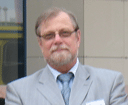
Alexander Elokhin was born on 25 November 1943 in Komsomolsk-on-Amur. In 1993 he enrolled in the Moscow Engineering and Construction Institution and later transferred to the Moscow Engineering and Physics Institute (MEPhI) where he graduated from Chair #1 (Biophysics, Radiation Physics and Ecology) in 1970 as an engineer-physicist specialising in dosimetry and protection (radiation physics). He is married and has a son.
Between 1970 and 1986 Alexander worked at the Scientific and Research Equipment Institute (NIIP) in the town of Lytkarino of the Moscow Region. During this time he researched the influence of ionizing radiation (IR) on components of radio-electronic equipment and its resistance to radiation and also transfer and transmission of IR through heterogeneous structures such as di-electric (non-conducting) metals.
In 1983 Alexander defended his candidate of science thesis titled “Influence of IR on heterogeneous systems of radio-electronic equipment” at MEPhI.
He became a candidate of science in Physics and Mathematics (22 published works: articles, reports, inventions).
Between 1986 and 2001 he worked as a senior scientist (both an academic rank and a job title) at Russian Scientific and Research Institute of Nuclear Power Plants Operation (VNIIAES) in the Radiation Safety department. He concentrated on researching Automated Systems of Radiation Control at NPPs (ASKRO), developing mathematical equipment and software in transfer of radioactive admixtures in the atmosphere and pollution of the environment and ASKRO optimization.
Between 1987 and 1990 he worked in Chernobyl within the framework of the institute main research (ASKRO development and implementation at the Chernobyl Nuclear Power Plant). He participated in elimination of the consequences of the Chernobyl catastrophe.
In 1994-1995 he took active part in an international program TACIS-1.11 (Nuclear Power Plants Monitoring Systems) as a representative of the VNIIAES scientific supervisor responsible for the ASKRO mathematical support. He authored more than two hundred articles and reports on the topic. Seventy of these papers were published in Russian and international journals, and several patents and inventions were registered.
He became a member of the Russian Nuclear Society (RNS) in 1997 (membership number 3812).
In April 1997 he commenced employment at the Scientific and Engineering Centre for Nuclear and Radiation Safety (SEC NRS) as the Laboratory Head of the Radiation Safety division. On 3 December 2001 he defended his doctorate thesis titled “Optimization of Methods and Tools for Automated Control Systems of Radiation Situation in the Environment” at MEPhI.
Alexander is interested in researching radiation physics, nuclear physics equipment, radiophysics, radiation safety, automated systems of environmental radiation monitoring, and ecology of the environment.